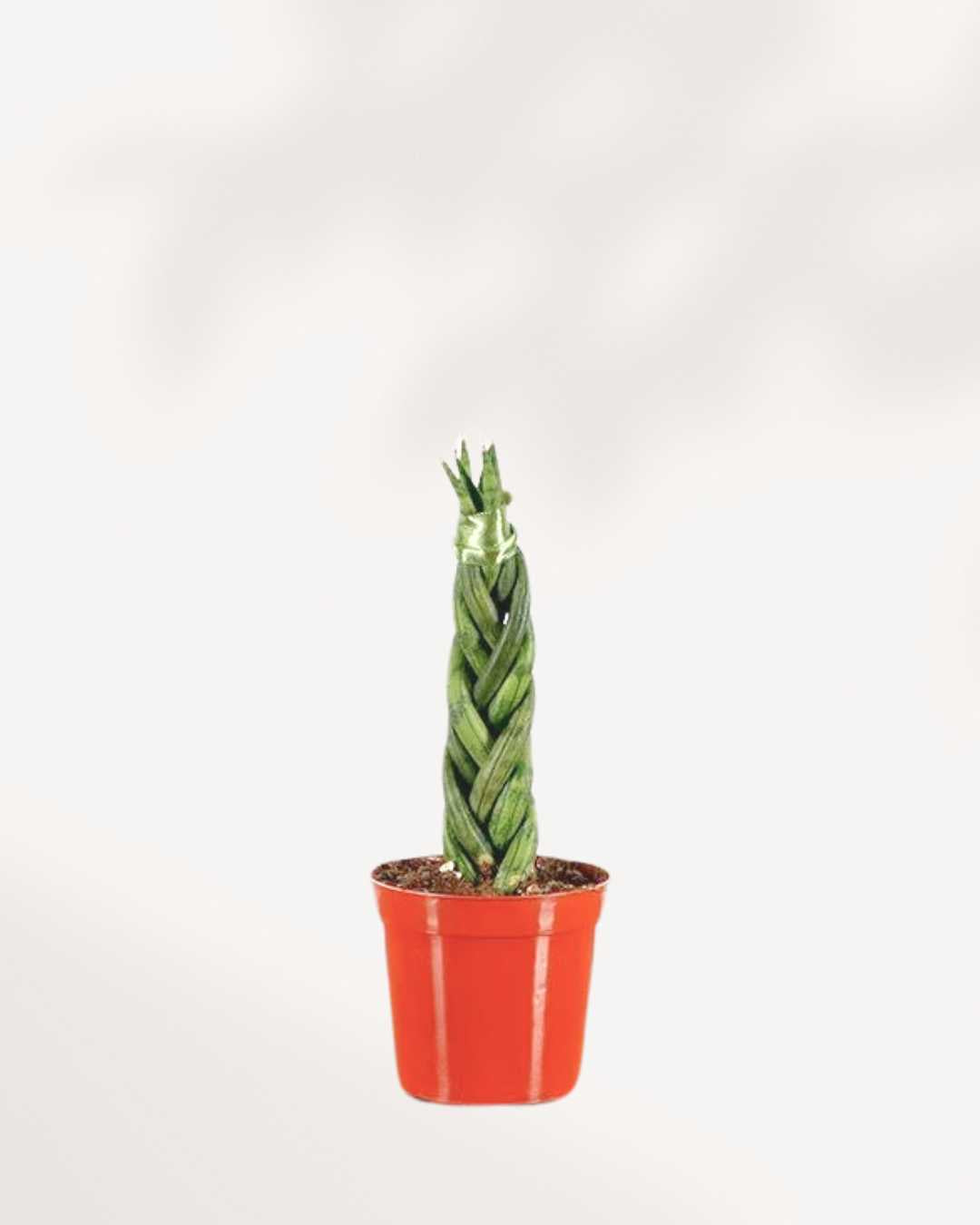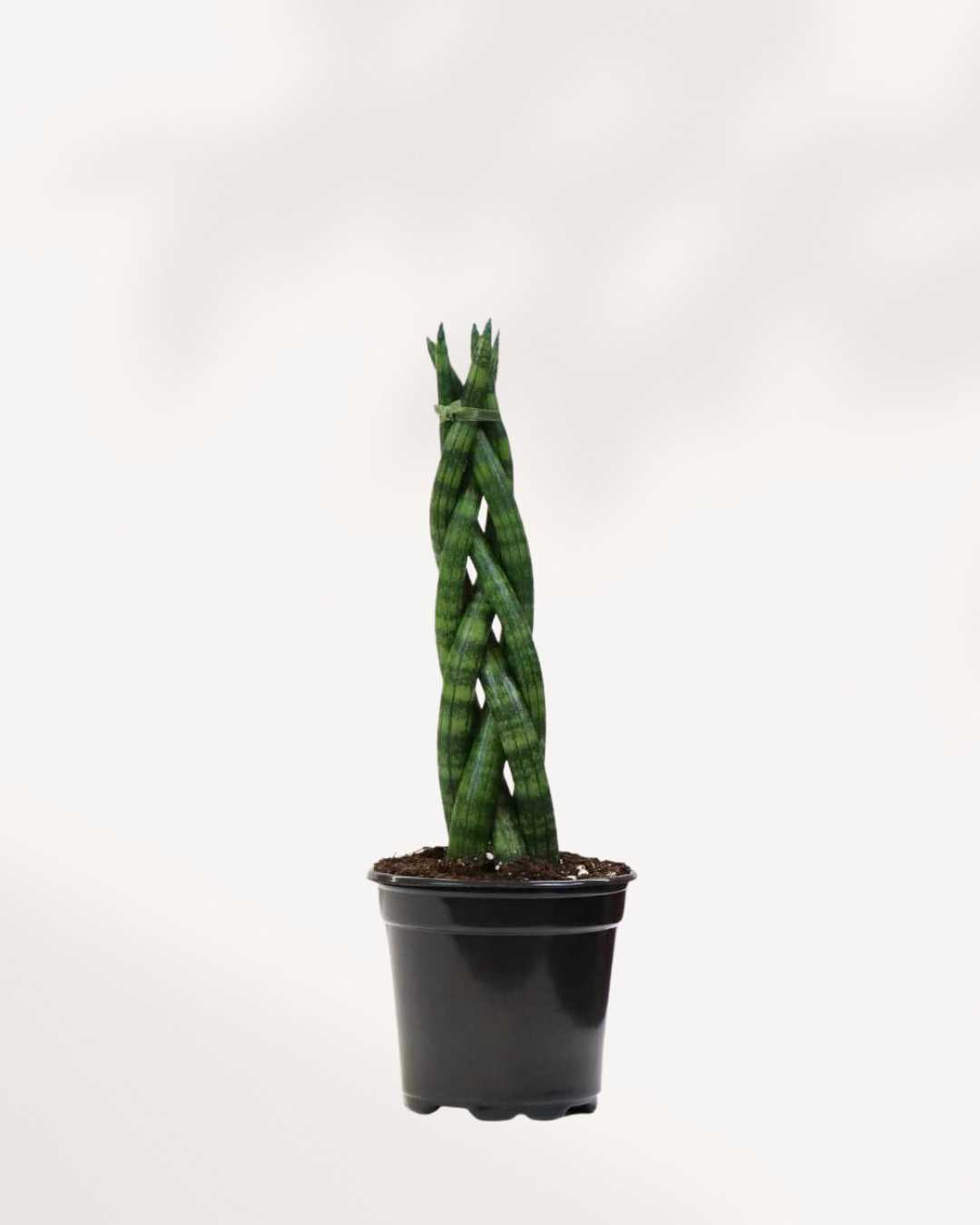Couldn't load pickup availability
Sansevieria Cylindrica Braid, also known as the African Spear Plant, is a visually striking succulent recognized for its tall, cylindrical leaves that are often braided for added elegance. This hardy and low-maintenance plant is perfect for both beginners and experienced plant owners. Its unique shape and air-purifying qualities make it a popular choice for modern interiors and offices.
Common Names
- Sansevieria Cylindrica Braid
- African Spear Plant
- Spear Sansevieria
- Snake Plant Braid
Botanical Classification
- Kingdom: Plantae
- Order: Asparagales
- Family: Asparagaceae
- Genus: Dracaena (formerly Sansevieria)
- Species: Dracaena angolensis
Native Habitat
Sansevieria Cylindrica Braid originates from Angola in Africa, where it thrives in arid and semi-arid conditions. Its ability to store water in its leaves allows it to withstand long periods of drought, making it an excellent plant for low-maintenance indoor gardening.
Historical and Cultural Significance
Renowned for its resilience, Sansevieria Cylindrica Braid has been associated with good luck and positive energy in many cultures. Its sculptural appearance makes it a favorite in Feng Shui practices, symbolizing protection and strength.
Uses and Popularity
The sleek and modern look of Sansevieria Cylindrica Braid makes it a go-to plant for minimalist decor. It’s also prized for its air-purifying properties, as it helps remove toxins like formaldehyde and benzene from the air. Its low water requirements and tolerance for low light make it ideal for busy households and offices.
Conservation Status
Sansevieria Cylindrica Braid is widely cultivated and not considered endangered. Its availability in nurseries and garden centers ensures it remains a staple in indoor plant collections.
Description
Physical Characteristics
Sansevieria Cylindrica Braid is characterized by its tall, tubular leaves that grow upright and can be braided for a decorative effect. The leaves are dark green with light gray-green stripes, giving it a sophisticated appearance.
Growth Habit
This plant has a slow growth rate and typically reaches heights of 2 to 4 feet. It grows in clusters, making it an excellent statement plant for tabletops, shelves, and corners.
Popular Sansevieria Varieties
Sansevieria Boncel (Starfish Sansevieria)
- Compact and fan-shaped with thick, pointed leaves resembling a starfish.
Sansevieria Black Coral
- Dark green foliage with silver horizontal stripes for a bold appearance.
Sansevieria Laurentii
- Classic snake plant with bright yellow edges and deep green leaves.
Sansevieria Moonshine
- Silvery-green leaves with a soft glow, ideal for modern interiors.
Sansevieria Dragon Fingers
- Tall, cylindrical leaves that resemble fingers, perfect for contemporary designs.
Care Guide
Light Requirements
Sansevieria Cylindrica Braid prefers bright, indirect light but can tolerate low-light conditions. For best results, place it near a window with filtered light. Plant Light Requirements
Watering Needs
Water sparingly, allowing the soil to dry out completely between waterings. Overwatering can lead to root rot. Reduce watering frequency during winter. Indoor Plant Watering
Soil Preferences
Use a well-draining cactus or succulent potting mix to avoid water retention. Adding sand or perlite improves drainage. Indoor Potting Mix
Humidity
It adapts well to average indoor humidity and doesn’t require additional misting, making it ideal for dry environments.
Temperature
Thrives in temperatures between 60°F to 85°F (16°C to 29°C). Keep away from cold drafts and frost.
Common Pests
Spider Mites
Spider mites can cause leaf damage. Regular cleaning and misting prevent infestations. Learn More
Mealybugs
These pests can be removed with rubbing alcohol or insecticidal soap. Learn More
FAQs
How tall can Sansevieria Cylindrica Braid grow?
It can grow up to 2-4 feet, depending on care and light conditions.
Does Sansevieria Cylindrica Braid need direct sunlight?
No, it prefers indirect light but can tolerate low light. Avoid direct sunlight to prevent scorching.
How often should I water it?
Water only when the soil is completely dry. Overwatering can lead to root rot.
Is it pet-friendly?
No, it is toxic to pets if ingested. Keep it out of reach of cats and dogs.
Can it purify the air?
Yes, it removes toxins like formaldehyde and benzene, improving indoor air quality.
How to take care of Sansevieria Cylindrica Braid
Sun: Indirect
Sun: Indirect
Light: Low
Light: Low
Water: When fully dry
Water: When fully dry
Humidity: Low
Humidity: Low
Pet Friendly: Caution
Pet Friendly: Caution
Pro Tip
Pro Tip
Delivery Policy for Plant Condition
Delivery Policy for Plant Condition
"I have only received part of my order. What to do?
No worries if you've only got part of your order! Our plants come from different nurseries and might arrive in separate shipments, typically 1-2 days apart. It's all part of ensuring your green friends reach you in top-notch condition!
If you do not receive the remaining packages within 48 hours contact support at info@mygreenscape.ca
What is the Life Time Support?
Absolutely! Lifetime support means you can count on us whenever you have questions or uncertainties about your plant. Whether you're puzzled by its behavior or just want to ensure it's thriving, we're here for you. Connect with us on Instagram @mygreenscapeto or shoot us an email at support@mygreenscape.ca.
When it comes to our guarantee for plants shipped with standard or express, rest assured that we offer a 30-day happy healthy plant guarantee on all such shipments. This ensures that your plants are covered for 30 days after delivery, giving you peace of mind regarding their condition. If you have any concerns within this period, feel free to reach out to us for assistance.
For further details, please visit our Local Delivery, Store Pickup, Standard Shipping Guide Page.
What to expect
What to expect
Your plant will arrive in a standard nursery pot, typically 0.5" - 1" smaller than the stated size to seamlessly fit into your chosen decorative pot. Washable Paper Planter Bags are available for separate purchase.
Just like nature intended, each plant is unique, showcasing natural variations in size, shape, and characteristics. Our commitment is to deliver a plant that closely resembles the one featured on our website, matching your chosen size, and with the potential to thrive happily in your home.
Frequently Asked Questions
Frequently Asked Questions
Certainly! If you're pondering about ordering plants online, you're not alone. We've compiled the most frequently asked questions. Check out our FAQ section here for quick answers! Happy planting!
Plant & Pot Size Chart
Plant & Pot Size Chart
Choosing the right pot size for your plants can be a daunting task, especially if you're new to gardening. But fear not! Our pot sizes chart can help you find the perfect match for your plants, ensuring they have enough space to grow and thrive. With our guide, you'll be able to confidently choose the right pot size and plant variety for your gardening needs.
Plant Pot Size Guide.

| Extra Small | 7-10 cm | 2.5 - 3 inches |
| Small | 11-12 cm | 3.5 - 4 inches |
| Medium | 14-17 cm | 5 - 6 inches |
| Large | 19-21 cm | 8 - 10 inches |
| Extra Large | 24-27 cm | 12 - 14 inches |
All sizes are specified in product details.
Your Complete Guide to Pot Sizes: What Size Should You Choose?

When selecting a pot for your plant, it's important to find the right size. But with all the different options out there, how do you know which one is best? We're here to help!
MyGreenscape's pot sizes chart is a great resource for finding your perfect fit. Our easy-to-read chart takes out all the guesswork and helps you quickly choose the right size for your plant.
Smaller pots are best for seedlings or small plants just starting out. These tend to be shallow but wide, allowing enough room for the roots of the young plant but not too much where they get overcrowded. Medium-sized pots are ideal when your plant has grown from its infancy and is ready for more space. These are deeper and wider than small pots, so that it can accommodate larger root systems - making sure your plant gets enough nourishment while still giving it breathing room. Large pots are top choice if you have an established plant in need of lots of space - think trees and large shrubs! The spacious depth and width allow plenty of room for deep root systems without struggling for air or light.
No matter what size you choose, MyGreenscape has got you covered, with our pot sizes chart guaranteeing you find the perfect fit every time!
Winter Shipping Protection
Winter Shipping Protection
We take extra care with each package during the colder months. For destinations experiencing cold weather, we provide insulated packaging and heat packs as needed to protect your plants from freezing temperatures. With Winter Shipping Protection, your plants are equipped to arrive safe and sound, even in winter’s chill.
Care Guide
Care Guide
Explore essential care tips. check out our Comprehensive Resource for Indoor Plant Care.


WATERING MADE EASY
Check soil moisture before watering and use a potting mix that drains well. It’s the secret to healthy, happy plants!
Hear From Happy Plant Parents.
Who have brought Mygreenscape plants into their homes.







